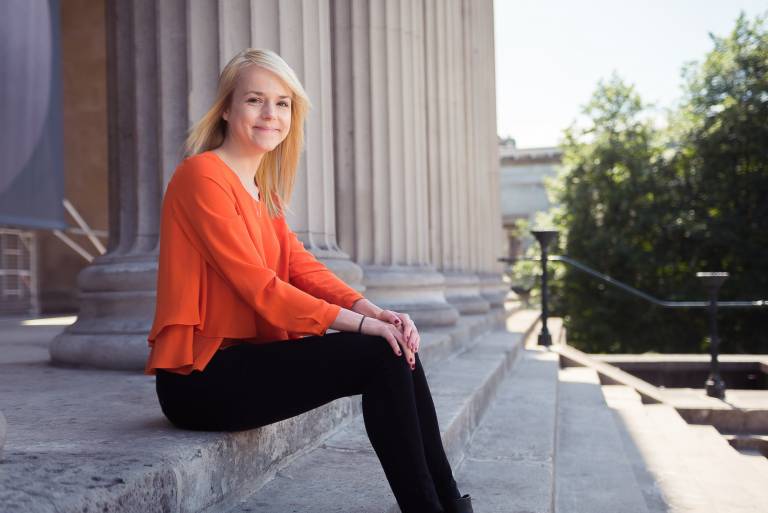Spirit of SLMS Winner (Scientific Excellence & Leadership): Andrea Smith
18 October 2018
Andrea is an Austrian-British student who completed her PhD in 2018 in the Research Department of Behavioural Science and Health investigating the genetic and environmental origins of food and drink preferences and their relationship with adiposity, under the supervision of Dr Clare Llewellyn.
 She is now working as a postdoctoral researcher in the new UCL-based NIHR Obesity Policy Research Unit.
She is now working as a postdoctoral researcher in the new UCL-based NIHR Obesity Policy Research Unit.
Her current research projects aim to produce the evidence needed to develop innovative tools concerning behavioural obesity research. One project she is involved with is the creation of a visual toolbox to support health professionals in talking to parents about overweight and obesity among preschool children. A body scanner has been used to produce the very first anatomically accurate 3D body images of preschool children and will assess the utility of these scales as a tool to support parental recognition of their child's weight status. Ultimately, this work will help to influence and deploy public health policy to reduce the prevalence and cost of childhood obesity in the UK.
Tell us a bit about your research achievements.
One completed project that stands out is the RESIST study (The REduction of Sugar In tea STudy), for which I piloted a behavioural modification program in 77 UCL students to reduce their sugar intake in tea. Little is known on how people can best decrease their liking of sweetness in drinks but many want to cut down on the sugar they consume because of the bad effects it may have on general health, weight or their teeth. Using data and insights gained from my PhD research, I designed and conducted my own randomized controlled trial testing two approaches to reduce liking for sugar in tea - a gradual reduction group versus a 'cold-turkey' quitting group. The exciting aspect of this study was that I tested the programme with UCL students - peers that I otherwise would have never met. Overall it was incredibly fulfilling to see that 17 UCL students successfully quit sugar entirely and a further 17 participants significantly cut back on their sugar intake in tea after completing my programme.
What have been some of the great milestones and/or achievements for you during your time at UCL?
Over the past years I have been involved with the Gemini twin cohort study, a hugely valuable study set up 11 years ago in our department. This unique longitudinal birth cohort of 2400 twin pairs is focused on studying the origins of appetite and growth in early childhood. Using data collected from the twins we can apply statistical techniques to untangle the importance of nature and nurture in eating behaviours.
When I first started my PhD, I collaborated with my brilliant Gemini team members on a study to investigate the genetic origins of fussy eating in infancy - little did we know that the publication of this project would end up going viral! It was a truly exciting and rewarding experience to see so much interest from popular media in our research. I was even invited to give live interviews on the Today Show on BBC Radio 4, BBC World News, Victoria Derbyshire, CNN, ITV and talked about the research to many national and international print and television journalists.
Of course, submitting my thesis in front of the UCL portico with my PhD colleague Moritz is a memorable milestone that I will treasure forever!
What role do you think public engagement of science plays in wider society?
I'm hugely passionate about public engagement in science - it is one of the most rewarding ways to translate research into meaningful action! First, public engagement can help to give a face to who is actively working in research. It doesn't always have to be a nutty professor in a lab coat staring down a microscope. Secondly, I think public engagement in science has a transformative power. For the research community, it forces us to think about clear, creative and engaging ways of showcasing research which can help to re-shuffle rigid thought processes. On the other hand, public engagement allows wider society to have their voices and values heard, thereby allowing individuals to actively shape the 'what' and 'how' of future research.
Top 3 places/things to do in London?
That`s a tricky question, there are plenty of fantastic places and activities in London.
At the moment, I am particularly loving any of the numerous parks as soon as the sun comes out. People flock to the parks and it's lovely to see so many happy faces out and about.
I also love Camden Market. There is always so much going on, all the stalls are fantastic to explore, and the energy is amazing. And the people-watching is pretty spot on too.
Finally, I'm going to be controversial here and say that Homeslice is my favourite pizza place in London. They have truly unique toppings and, importantly, prosecco on tap!
What would surprise people about you?
Confession time! I used to collect bottle caps from all over the world. Every time friends, family members or neighbours went travelling I would ask them to bring back unique and colourful bottle caps. I carefully counted and recorded them and over many years ended up with a huge collection of over 2000! I still can't believe my parents let me get away with that.
 Close
Close



